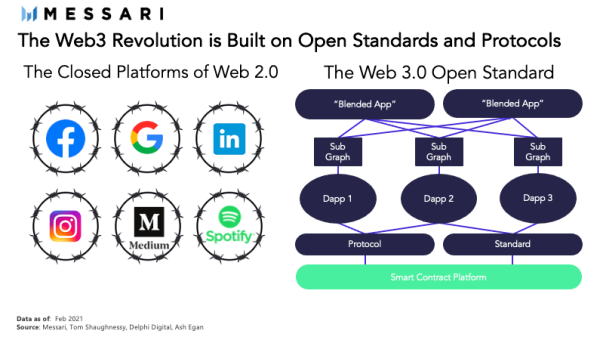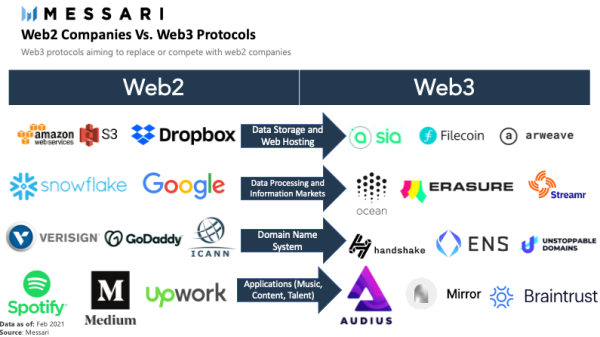| In a nutshell-Web3 is the next era of the Internet. Web 3.0, commonly known as Web3, is a paradigm that promotes the transformation of the Internet in a more democratic direction. |

Web3 is manifested through new technologies, such as cryptocurrency, virtual reality, augmented reality, artificial intelligence and so on. Driven by new technologies, the Web3 movement bears the brunt of the impact: the way we, the collective and the public, view and evaluate the Internet. The mission of Web3 is to create an Internet that serves the masses and is owned by the masses.
1. The Internet: Creates out of nothing, but changes everything
The Internet has fundamentally changed the world we live in. This is not an undisputed fact. The Internet has changed everything, which is worth emphasizing again, because the role of the Internet has been greatly underestimated.
Just find a question or topic you care about-whether it is an economic issue, a political issue, or a social issue-immediately Google it or Baidu, the search results will show that the Internet has fundamentally reshaped or changed this problem.
From an economic perspective-the Internet has directly led to the rise of globalization and e-commerce. These two trends have profoundly affected the world. More specifically, in the past three years (2017, 2018, and 2019), the value of S&P 500 technology stocks has doubled, and technology stocks now account for about 25% of all S&P 500 indexes.
From a social perspective-the influence of the Internet is obvious, and even the word "Social" has a new meaning compared to 20 years ago. Once young startups such as Facebook, Google, Instagram, and Twitter, now they generate more than 40% of their revenue in the form of advertising. And this income is paid by the venture capital of the new start-up company. The potential future impact of new platforms like TikTok is still undetermined, but it is promising for influential people on social media.
This is to say that the monopoly of social relations also monopolizes the income. It is concentrated in advertising revenue. What the author wants to express is that social is social, and the Internet is the Internet.
From a political perspective, algorithms that provide selected news and aim at "incitement rather than coalition" have become the norm in Western media. The Internet has affected political elections around the world and has created a new generation of bureaucrats whose native language is the Internet.
The Internet has changed everything-financial markets, culture, elections, everything. This has almost become an iron law, a law with few exceptions, so it may be a natural law. In 10 or 20 years, events generated or caused by the Internet will shape the world more deeply and more frequently. This is why the fate of the Internet has become more important than ever.
2. Why do we need Web3?
The early days of the Internet were pioneering. Similar to the "determination of destiny" thought in the development of the western United States—the American expansion in the American continent was considered reasonable and inevitable—the early technological pioneers explored, isolated, blocked, and commercialized the Internet. Over time, although the Internet is still "free" and "free", it has also been severely damaged.
When you are buying bus tickets, train tickets or air tickets, you may see this in your life: all your searches are recorded, sold, and manipulated. The Internet is used by you, but you are not its owner. Individuals around the world face greater challenges, especially when the Internet is partially isolated, restricted, or even completely blocked.
The fundamental feature of the Internet is the democratization of information. However, today, information is becoming increasingly unreliable, siloed, isolated, and in some cases completely harmful. Fake accounts controlled by robots are manipulating children; lifelike faces created by artificial intelligence will cause greater problems to society through deep fraud and identity theft; in 2019, the economic loss caused by fake news exceeded US$70 billion, and this loss It will only increase over time; the human environment in which the virus spreads has spawned digital viruses-fake news stories-which spread six times faster than real news stories. This trend has extremely important implications.
3. Web3: A world of open protocols
Web3 is to redesign existing Internet services and products to benefit the public rather than corporate entities. Although we cannot predict the future, the vision of Web3 is to provide convenient access and other more features based on open source protocols and business as an interface. Web3 is an Internet open to all users, built on an open protocol and a transparent blockchain network. The way consumers interact with these protocols may be through a new type of application, which provides a convenient way to interact with the underlying technology.

Of course, data will still be used to drive decisions, but it will not be used to exploit consumers. Data rights will be protected instead of being trampled in pursuit of profit. Incentive mechanisms and market mechanisms will help ensure the credibility and verifiability of information.
The world of Web3 will prioritize the sovereignty of individuals, rather than the wealthy elites and rent-seekers in the world. The focus of redesigning systems and protocols is democratization and decentralization.
4. What are some examples of Web3?
Compared with DeFi, Web3 is more in its infancy, so naturally there are not so many concrete examples. However, just as finance has various applications, such as lending, the Internet is composed of various services and components.

4.1. Internet architecture and services
The architecture of the Internet is not what most people care about. Your network is either working normally, there is a delay, or it is down. But you may know that Comcast, AT&T, or your ISP (Internet Service Provider) is deceiving you. They promise to connect quickly, and then either charge you a high fee or downgrade to provide you with services. New service providers like Andrena and Althea bypass these existing Internet service providers by creating community networks. In the community, individuals can operate and get paid to provide Internet services to members of the community.
For example, a landlord or tenant can invest in an Andrena hotspot so that all tenants can join the Andrena wireless network and pay the landlord for personal data consumption. Or, apartment tenants can purchase a smaller hotspot to provide their neighbors with enough internet connections to offset their personal internet consumption.
Other blockchain networks, such as Handshake, and some companies like Unstoppable Domains, are committed to democratizing the existing Domain Name System (DNS). DNS maps an IP address to a human-readable address, such as Messari.io. Domain name registration is the unilateral control of intellectual property rights by organizations like Verisign and ICANN. For free speech sites like WikiLeaks, these organizations can censor and confiscate domain names (IP addresses) without due process. Although not all of these reviews are negative, their subjectivity is worrying. Under normal circumstances, DNS decision-makers are the highest-level government officials and lobbyists for large multinational organizations. Their intentions may be good, but they do not always act in the best interest of the public.
4.2. Data storage, distribution and monetization
Twitter allows you to download all your own data. This is wonderful, until you actually download the data and realize that you have no idea what to do with it. I mean, this is your data. You should be inspired by it, right? The problem is that data is difficult to monetize on an individual level, but it is easy on the whole. In the first half of 2020, Robinhood generated nearly $300 million in revenue through sales of customer order flow data. Dozens of companies understand this concept, which is why Snapchat is losing money every year, but investors understand that the company has millions of Gen Z users and they generate (possibly valuable) data.
Organizations such as Ocean Protocol, Streamr, and Numerai are building protocols for open data markets where anyone can share their data or monetize it. Data is the basic component of value storage and transmission on the Internet. The commoditization of data has not yet been realized because the data is vertical, sensitive, or proprietary. The new Web3 protocol provides a means for the market in which sensitive data can be shared and proprietary data can be accurately priced and sold. Converting data into tangible data assets (tokens) will release value and develop a stronger data ecosystem.
Another key component of data is cross-server storage, which is mainly controlled by several large companies. Decentralized data storage and web hosting services like Sia, Arweave, and Filecoin are supporting the creation of new decentralized applications.
4.3. Apps and other Internet infrastructure services
Readers use so many services that you may not even realize it. WIFI, location service (GPS), Bluetooth connection, messaging service (iOS, Android), video and audio streaming (Youtube, Twitch, Spotify), etc.
A few stakeholders control all these applications. More importantly, the services and infrastructure used by these applications are concentrated in the hands of a few large companies (such as Google, AWS, Microsoft). New protocols and companies like Helium (open wireless network), Foam (open location service), Livepeer (video transcoding and streaming), Orchid, etc. are all building distributed and community-operated services.
These community-owned and operated services are cheaper because they can avoid middlemen. For example, Youtube and Twitch are not just content distribution engines. The streaming giant provides "free" data storage for all videos provided by content creators. Youtube and Twitch also assist in video transcoding to ensure that viewers can use specific videos in the desired format. The ability to provide all these services seamlessly helps to embed content producers into each platform.
The Web3 protocol can decompose the capabilities of a single company by decomposing the services the company provides to users. Audius (music streaming), OurZora (open media market), and Mirror (decentralized distribution platform) are all creating platforms. Users have their own content and have a say in the management of these platforms.
In the future, content creators will be able to openly store data generation and data consumption separately. Although these services are not very convenient now, they will be built into the underlying platform you use every day in the future.
5. Final thoughts on Web2 and Web3
It is easy for people to feel dissatisfied and angry with corporate elites, the government, or anyone who manipulates the Internet for their own benefit. Although understandable, I don't think this is the correct view.
Initially, the Internet needed pioneers and enterprise development tools to make the Internet an accessible infrastructure for the general public. These pioneers received their due rewards. As long as the existing Internet design continues to be decentralized, we will continue to give our data, time and money to large technology companies in exchange for the promise of free access to convenient products. To be honest, there is no one solution that can cure all diseases. This requires countless attempts, changes in consumer behavior and technological innovation.
As we approach a world that is increasingly controlled by technology, it is important that we redesign the system and adjust the incentive mechanism to benefit the public. The transition from the existing Internet-Web2 to Web3-is a decades-long process that will fundamentally change the way we interact with the Internet. The decisions and work made today will add up and affect future generations. Just like the financial revolution led by DeFi, the Web3 revolution is inevitable and will advance gradually, and then all at once.